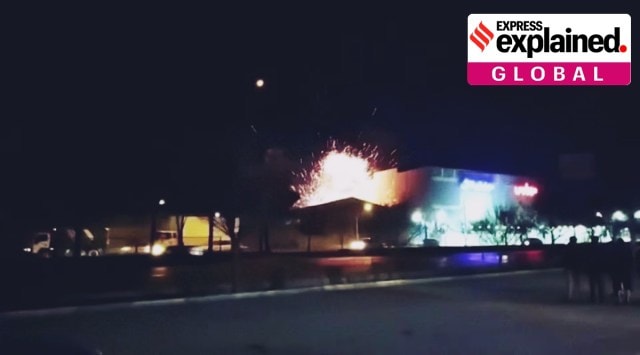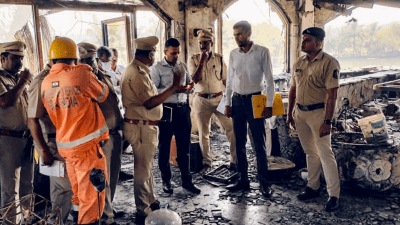Iran blames Israel for Isfahan drone attack: What has happened so far?
The drone attack targeted a military factory in Isfahan on Saturday night, causing minor damage, according to authorities. Iran has threatened retaliation.
 Eyewitness footage shows what is said to be the moment of an explosion at a military industry factory in Isfahan, Iran, January 29, 2023, in this still image obtained from a video. Pool via WANA (West Asia News Agency) via REUTERS
Eyewitness footage shows what is said to be the moment of an explosion at a military industry factory in Isfahan, Iran, January 29, 2023, in this still image obtained from a video. Pool via WANA (West Asia News Agency) via REUTERSIn what appears to be the latest instalment in the two countries’ long-running covert war, Iran has accused Israel of carrying out a drone attack on the central city of Isfahan on Saturday. The attack was carried out on a military factory and caused “minor damage”, claimed Iran.
Its ambassador to the UN, Amir Saeid Iravani, said findings indicated Israel “was responsible for this attempted act of aggression”. Israel has neither confirmed nor denied its role in the attack.
“Iran reserves its legitimate and inherent right to defend its national security and firmly respond to any threat or wrongdoing of the Zionist regime wherever and whenever it deems necessary,” said Iravani.
Iran and Israel have long shared a strained relationship, which often boils over to myriad acts of aggression and proxy conflict.
The attack
On Saturday night, at around 11:30 pm, three drones entered Iranian airspace with an intent to attack a military installation in the city of Isfahan, Iran’s defence ministry said in a statement. It said one was destroyed by air defence systems and two were caught by “defence traps”, causing minor damage to a building. There were no casualties, it said.
While the exact nature of the military establishment that was attacked is unclear, Iran’s state-run news agency described it as an “ammunition manufacturing plant”. Notably, the Isfahan province is home to a large air base, a major missile production complex and several of Iran’s nuclear sites, including its crown jewel, the Natanz nuclear plant.
Fingers point to Israel
While the US officially stated that it had no hand in the attack and did not wish to speculate further, The New York Times, Al Jazeera and The Wall Street Journal quoted anonymous US officials saying that Israel was behind the attack.
On Tuesday, Israeli premier Benjamin Netanyahu gave an interview to CNN where he admitted to “taking action against certain weapons development” in Iran but refused to comment on Saturday’s operation. “I never talk about specific operations… and every time some explosion takes place in the Middle East, Israel is blamed or given responsibility – sometimes we are, sometimes we’re not,” said the Israeli leader.
Not the first time
This is not the first time that Iranian military installations have been attacked or sabotaged. In 2021, Iran’s Natanz nuclear facility faced a mysterious blackout, damaging a few of its centrifuges in the process. Iran blamed an Israeli conspiracy behind the act of sabotage.
There have also been a number of explosions and fires around Iranian military, nuclear and industrial sites in recent years.
Between 2010 and 2012, four Iranian nuclear scientists were assassinated while another one was wounded. In 2020, another Iranian scientist was assassinated. On each of the occasions, Iran blamed Mossad, Israel’s national intelligence agency, a claim which was corroborated by the US, according to the NBC.
In a separate incident on Saturday last week (January 28), a fire broke out at an oil facility near the north-western city of Tabriz, reported the BBC. Details about this incident are yet to be revealed.
A history of antagonism
Iran and Israel have shared a long history of antagonism, starting post the 1979 revolution in Iran which removed the West-friendly Shah from power. Today, Iran does not recognise Israel’s right to exist and has been behind Palestinian insurgency for years, funding, arming and training groups like Hezbollah.
On the other hand, Israel’s controversial Begin doctrine has been a source of significant conflict – diplomatic and otherwise – between the two nations. The Begin doctrine effectively dictates that even the potential of an enemy having weapons of mass destruction (nuclear weapons) can justify preventive strikes from Israel. On top of this, Israel too has supported a long insurgency in Iran, funding the People’s Mojahedin Organization of Iran.
The two countries have been engaged in multiple proxy conflicts, and actually came face to face during the 2006 Lebanon War.
- 01
- 02
- 03
- 04
- 05






































